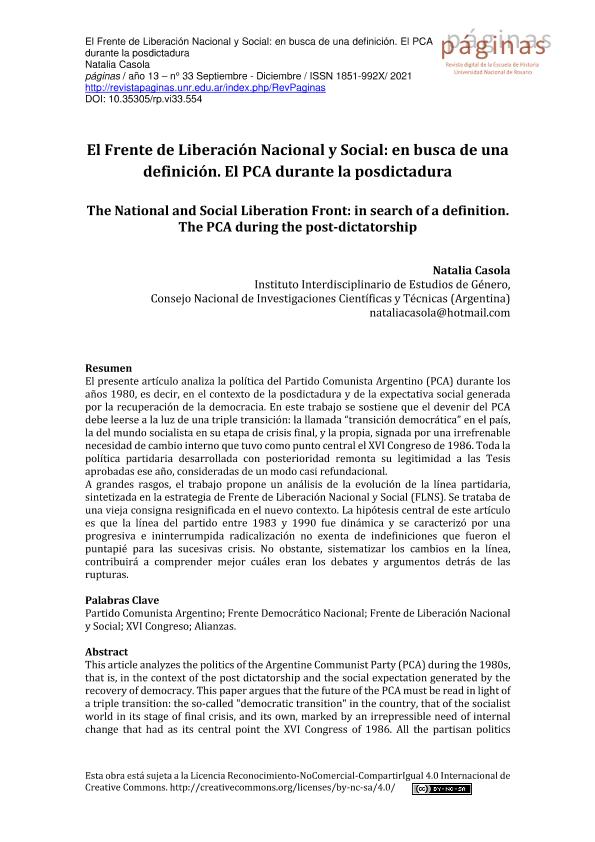Mostrar el registro sencillo del ítem
dc.contributor.author
Casola, Natalia Laura

dc.date.available
2022-08-19T16:38:25Z
dc.date.issued
2021-12
dc.identifier.citation
Casola, Natalia Laura; El Frente de Liberación Nacional y Social: En busca de una definición. El PCA durante la posdictadura; Universidad Nacional de Rosario. Facultad de Humanidades y Artes. Escuela de Historia; Páginas; 33; 12-2021; 1-19
dc.identifier.issn
1851-992X
dc.identifier.uri
http://hdl.handle.net/11336/166117
dc.description.abstract
El presente artículo analiza la política del Partido Comunista Argentino (PCA) durante los años 1980, es decir, en el contexto de la posdictadura y de la expectativa social generada por la recuperación de la democracia. En este trabajo se sostiene que el devenir del PCA debe leerse a la luz de una triple transición: la llamada “transición democrática” en el país, la del mundo socialista en su etapa de crisis final, y la propia, signada por una irrefrenable necesidad de cambio interno que tuvo como punto central el XVI Congreso de 1986. Toda la política partidaria desarrollada con posterioridad remonta su legitimidad a las Tesis aprobadas ese año, consideradas de un modo casi refundacional. A grandes rasgos, el trabajo propone un análisis de la evolución de la línea partidaria, sintetizada en la estrategia de Frente de Liberación Nacional y Social (FLNS). Se trataba de una vieja consigna resignificada en el nuevo contexto. La hipótesis central de este artículo es que la línea del partido entre 1983 y 1990 fue dinámica y se caracterizó por una progresiva e ininterrumpida radicalización no exenta de indefiniciones que fueron el puntapié para las sucesivas crisis. No obstante, sistematizar los cambios en la línea, contribuirá a comprender mejor cuáles eran los debates y argumentos detrás de las rupturas.
dc.description.abstract
This article analyzes the politics of the Argentine Communist Party (PCA) during the 1980s, that is, in the context of the post dictatorship and the social expectation generated by the recovery of democracy. This paper argues that the future of the PCA must be read in light of a triple transition: the so-called "democratic transition" in the country, that of the socialist world in its stage of final crisis, and its own, marked by an irrepressible need of internal change that had as its central point the XVI Congress of 1986. All the partisan politics developed later goes back to its legitimacy to the Theses approved that year, considered in an almost refundational way. Broadly speaking, the work proposes an analysis of the evolution of the party line, synthesized in the strategy of the National and Social Liberation Front (FLNS). It was an old resignified slogan in the new context. The central hypothesis of this article is that the party line between 1983 and 1990 was dynamic and characterized by a progressive and uninterrupted radicalization, not without its indefiniteness, which were the kick-start for the successive crises. However, systematizing the changes along the lines will contribute to a better understanding of the debates and arguments behind the ruptures.
dc.format
application/pdf
dc.language.iso
spa
dc.publisher
Universidad Nacional de Rosario. Facultad de Humanidades y Artes. Escuela de Historia

dc.rights
info:eu-repo/semantics/openAccess
dc.rights.uri
https://creativecommons.org/licenses/by-nc-sa/2.5/ar/
dc.subject
PARTIDO COMUNISTA
dc.subject
POSDICTADURA
dc.subject
LÍNEA POLÍTICA
dc.subject
XVI CONGRESO
dc.subject.classification
Otras Historia y Arqueología

dc.subject.classification
Historia y Arqueología

dc.subject.classification
HUMANIDADES

dc.title
El Frente de Liberación Nacional y Social: En busca de una definición. El PCA durante la posdictadura
dc.title
The National and Social Liberation Front: In search of a definition. The PCA during the post-dictatorship
dc.type
info:eu-repo/semantics/article
dc.type
info:ar-repo/semantics/artículo
dc.type
info:eu-repo/semantics/publishedVersion
dc.date.updated
2022-08-18T15:55:47Z
dc.journal.number
33
dc.journal.pagination
1-19
dc.journal.pais
Argentina

dc.journal.ciudad
Rosario
dc.description.fil
Fil: Casola, Natalia Laura. Consejo Nacional de Investigaciones Científicas y Técnicas; Argentina. Universidad de Buenos Aires. Facultad de Filosofía y Letras. Instituto Interdisciplinario de Estudios de Género; Argentina
dc.journal.title
Páginas

dc.relation.alternativeid
info:eu-repo/semantics/altIdentifier/url/https://revistapaginas.unr.edu.ar/index.php/RevPaginas/article/view/554
dc.relation.alternativeid
info:eu-repo/semantics/altIdentifier/doi/http://dx.doi.org/10.35305/rp.vi33.554
Archivos asociados
